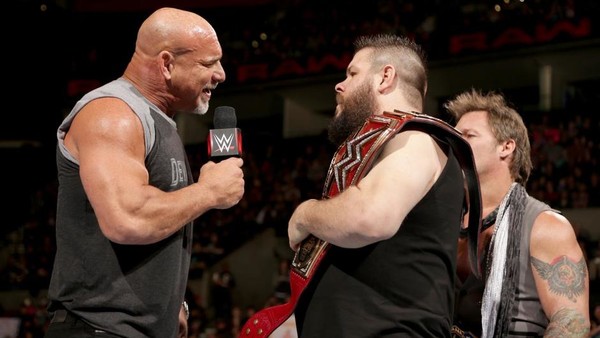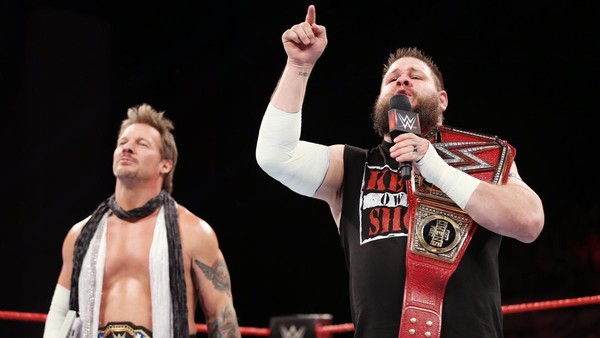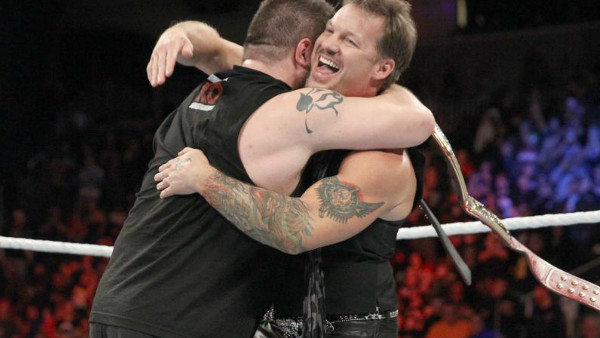Why WWE Is RIGHT To Transfer The Universal Title To Goldberg
Part time talent, full-on star.

You don’t need much in the way of prescience to see what WWE has pencilled in for the Fastlane pay-per-view on 5 March. All rumours indicate that Goldberg is set to wrest the Universal Championship from Kevin Owens in what will likely be a squash match. So too does common sense.
The Universal Championship debuted in auspicious circumstances. The name was as eye-rolling as the design was unimaginative. The first match contested for it - Finn Bálor’s SummerSlam 2016 victory over Seth Rollins - was excellent, even if its counterproductive midcard placement depicted it as a midcard prize. The match should have gone on last. Instead, it was relegated at the mercy of part-time star Brock Lesnar’s main event opposite Randy Orton. Bálor’s victory, of course, was pyrrhic; he was forced to relinquish his prize the next night through injury.
Eight days later on RAW, Owens captured the vacant belt when a returning Triple H all but handed it to him. The narrative confirmed that Seth Rollins was the better man, the rightful champion - but the master of episodic television meant that such a natural switch could not happen. WrestleMania had to be promoted. Buzz had to be created. Rollins had to cement his babyface turn by being faced with the sort of contrived obstacles WWE places in front of their protagonists to curry favour on their behalf.
That meant copious amounts of interference from Chris Jericho in Owens' never-ending autumn and winter series with Seth Rollins and Roman Reigns. Clash Of Champions, Hell In A Cell, Roadblock: End Of The Line - all matches were tainted with the repetition of the same emotional beats. Rollins and Reigns were better wrestlers than Kevin Owens - but the series of contrivances was required because the period between SummerSlam and the Royal Rumble is something of an inconvenience for a company that still refuses to institute an off-season. So, too, was the Universal Title. It existed purely as a means of facilitating filler rivalres before ‘Mania season began anew. The prestige of the title - one WWE had planned on taking seriously with a lengthy Bálor reign - would have to wait. WWE waited too long.
In the hands of Kevin Owens and Chris Jericho’s juvenile best buds schtick, it wasn’t even the prop many bemoan that Championships have degenerated into. It was a toy, shared by two codependent, squabbling children and held over the head of Rollins and Reigns with neh-neh-neh-neh-neh you-can’t-have-it glee. That Clash Of Champions main event was one of the least heated in recent memory. It didn’t feel like a major title match because it wasn’t contested for a major title.

The role of part-timers has been criticised within the wrestling fandom since The Rock first returned to WWE screens in 2011 - and not without some justification. Rock was unconcerned with the company’s top prize, but rather the man who held it. When he did put himself forward, in 2012, it was an afterthought. Brock Lesnar was similarly unconcerned; when he returned in 2012, his first target was John Cena. The most legitimate contender ever didn’t put himself forward for contention. Rock, Lesnar, Triple H, and the Undertaker occupied a stratosphere all of their own, one which did not bother itself with the championship gold they had long since transcended. The part-time stars weren’t there to work with their full-time counterparts. They were there to fight amongst themselves. What did it say about the top prizes if the men promoted as the biggest stars didn’t give two sh*ts about them?
Brock Lesnar bucked the trend when he set his sights on John Cena’s WWE Championship in the summer of 2014. Crucially, this came after his conquest of The Undertaker’s WrestleMania streak; in one stroke, the title was painted with more prestige than either it or the World Heavyweight Title aligned to its lineage had been in years and years.
The man makes the belt. Not the other way ‘round. Sheamus, The Miz, Jack Swagger - all were seen as paper champions because that’s what they were. Even if Kevin Owens was to retain the Universal Title at Fastlane - and it would have to involve chicanery, else suspension of disbelief would be stretched well beyond credulity - it would not disguise the fact that his match with Chris Jericho, that phenomenal Festival of Friendship fallout not withstanding, is the lesser attraction. Attempts to enhance it with the Universal Title would just underline the transparency. None of this is Owens’ fault - he doesn’t write his own storylines. But it’s a fault in dire need of correction.
An argument can be made that the Jericho Vs. Owens match needs - or, more accurately, requires - the Universal Title because it was effectively Jericho’s, too - but the JeriKO act indulged itself too much with comedy leanings throughout its run. It is a white hot midcard feud following the aftermath of this week’s RAW - but it’s a midcard feud, all the same. Funny don’t draw money, as Jim Cornette is fond of saying. Compare the atmosphere to Goldberg Vs. Lesnar at Survivor Series to Owens Vs. Reigns at Roadblock for confirmation. Owens even lampshaded the title’s lack of prestige by constantly referring to himself as the longest-reigning Universal Champion of all time. The joke was that the achievement was meaningless - so why should the audience have cared what happened to it?
Transferring the title to Goldberg makes sense from a storyline perspective, too. Why wouldn’t the top star want the top title? Why shouldn’t the (storyline) best wrestler hold it? The part-timer era remains a short term dead end - but a short term injection of prestige is precisely what the Universal Title needs in order for it to be perceived as an actual accomplishment.

Consider the hypothetical scenario: Finn Bálor returns to RAW the night after WrestleMania to challenge for Owens’ retained title. He beats him - but what does that mean? He beat a guy who couldn’t beat anybody without help. Owens wasn’t even a skilled cheat. He never once got away with it, necessitating rematch after rematch after rematch after rematch.
Now consider the alternative: Bálor returns to RAW the night after WrestleMania to challenge for Brock Lesnar’s newly-won Universal Title. The mere association with Lesnar would depict him as far more of a big deal. He channels The Demon and beats him in a landmark victory. Meanwhile, Owens destroys Jericho in a protracted blood feud to reignite his heat and reorient him as the sociopathic heel he was in NXT. That match, meh on paper without the wrinkle of Lesnar, becomes must-see, meaningful. To get to that stage, Owens would need to drop the title to Goldberg and drop the pretence that he’s a proper headliner. He isn’t - and it isn’t fooling or helping anybody.
Transference does work in wrestling. Kazuchika Okada became a star because he ended Hiroshi Tanahashi’s record-breaking fifth IWGP Heavyweight Title reign a mere month after his New Japan return in 2012. He was presented - and received - as a legitimate threat. It might not be a fair analogy - WWE is antithetical to NJPW in many ways - but it’s true nonetheless. WWE has botched the booking of Owens - and, in turn, his title - and it will take a similar act of bravery to resuscitate him. Transferring the spurious title to a top star would instantly legitimise it - and it badly needs such authentication. As it stands, it’s an ugly red trinket. That’s it.
At its peak, the revived big gold belt was perceived as the WWE Title’s equal. Around Kevin Owens’ waist, how many aspiring indy stars do you think dream of holding the Universal Title?
WWE has booked themselves into many a corner by presenting part-time stars with so much conviction - but it can remove itself from one by using one such star, Goldberg, to imbue the Universal Title with prestige. The man makes the belt, not the other way ‘round.
Goldberg Vs. Brock Lesnar is the big WrestleMania attraction. Consequently, it doesn’t “need” the belt - but the belt needs Goldberg Vs. Brock Lesnar.